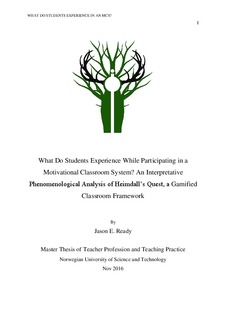| dc.contributor.author | Ready, Jason Edward | |
| dc.date.accessioned | 2017-02-14T11:49:31Z | |
| dc.date.available | 2017-02-14T11:49:31Z | |
| dc.date.issued | 2016 | |
| dc.identifier.uri | http://hdl.handle.net/11250/2430714 | |
| dc.description.abstract | Frafallet i norske videregående skoler har i flere år vært høyt i yrkesfaglige studieprogram. For å bekjempe dette problemet i skolen, har jeg laget et rammeverk som fokuserer på samhandling i klasserommet for å stimulere elevenes motivasjon, ansvar og innsats med mekanismer som fins i spill. Jeg kaller dette Motivational Classroom System.
Hensikten med denne studien var å få svar på min problemstilling, "Hva erfarer studentene når de deltar i et Motivational Classroom System (MCS)" Denne foreliggende kvalitative, fenomenologiske studien har undersøkt betydningen av elevenes erfaringer med å delta i MCS: Heimdall Quest i klasserommet. Fenomenologisk intervju ved hjelp av semi-strukturerte protokoller ble brukt til å fange opp erfaringer fra tre nåværende studenter og fire tidligere studenter som hadde fortsatt som lærlinger etter videregående. Alle deltakerne var norske og var mellom 16 og 26 år i løpet av den tiden de gikk i klassen. Seks av deltakerne var menn og det var en kvinnelig deltager i studien.
En fortolkende fenomenologisk analyse (IPA) av funnene avdekket følgende ti viktige temaer:
• Samarbeid: Elevene samarbeidet i alle aspekter i klasserommet, med gruppearbeid og individuelt arbeid ved bruk av HQ (Heimdalls Quest).
• Sosiale aspekter ved grupper: Studenter opplevde et mer sosialt og inkluderende klassemiljø når de var med i MCS grupper.
• Personlig valg: Studentene ble klar over det faktum at de hadde et valg og konsekvensene av disse valgene.
• Selvorganisering: Elevene lærte at for å fremgang i MCS, måtte de jobbe.
• Motivasjon: Elevene lærte motivasjon på ulike måter i spillet, i klasserommet og sosialt.
• Endring av adferd: Elevene hadde positive erfaringer med en MCS forhold til sine mest negative erfaringer med orden- og adferds karakterer på skolen.
• Erfaringspoeng(XP): Elevene var sterkt motiverte av ytre motivasjonsfaktorer som reflekterte deres progresjon.
• Powers: Studentene så på evner som en måte å forbedre innsats og kvalitet på arbeidet innenfor MCS.
• Oppmøte: Studenter hadde, mens de deltok i HQ, høyere oppmøte gjennom hele skoleåret.
• Spillmekanikk: I min studie, fant jeg ut at spill hadde en positiv effekt på både jenter og gutter.
Denne studien bidrar til forskning innen spill-teori og motivasjon. Denne forskningen har begrensninger som ikke generaliseres, men bidrar til forskningsfeltet. Funnene i studien kan bidra til å fremme bruken av spill i utdanning. | nb_NO |
| dc.description.abstract | Abstract.
Dropout rates in in Norwegian upper secondary schools have for several years remained high in vocational studies. In order to combat this problem in school, I have created a framework that interacts with the classroom in order to stimulate student motivation, responsibility and effort with mechanics that reside within games. I call this a Motivational Classroom System.
The aim of this study was to answer my research question, “What do students experience while participating in a Motivational Classroom System?” The present qualitative, phenomenological study explored the meaning of students’ experiences of participating in the MCS: Heimdall’s Quest in the classroom. Phenomenological interviewing using semi-structured protocols was used to capture the experiences of three current students and four previous students who had graduated on to apprenticeships. All of the participants were Norwegian and were between 16 and 26 years of age during the time they participated in the class. Six of the participants were male with one female partaking in the study.
An interpretative phenomenological analysis (IPA) of the findings revealed the following ten major themes:
• Cooperation: Students cooperated in all aspects of the classroom, group work and individual work, while participating in HQ.
• Social aspects of team: Students improved social connections with their classmates while participating in MCS groups.
• Personal choice: Students became aware of the fact that they had a choice and consequences of those choices.
• Self-organization: Students learned that to progress in the MCS, they had to work in the classroom.
• Motivation: Students learned to being motivated in various ways in the game, in the classroom and socially.
• Modifying behavior: Students had positive experiences with an MCS compared to their mostly negative experiences with orderliness and conduct grades in school.
• Experience Points (XP): Students were strongly motivated by extrinsic motivators that reflected their progression.
• Powers: Students viewed powers as a facilitator of improving classroom effort and quality of work within the MCS.
• Attendance: Students, while participating in HQ, had higher attendance throughout the school year.
• Game mechanics: In my study, I found that gaming had a positive effect on both girls and boys.
This study contributes to research in the field of game theory and motivation. This research has limitations which are not generalizable, but contribute to the research field. The findings of the study, may contribute to promoting the use of games in education. | nb_NO |
| dc.language.iso | eng | nb_NO |
| dc.publisher | NTNU | nb_NO |
| dc.title | What Do Students Experience While Participating in a Motivational Classroom System? - An Interpretative Phenomenological Analysis of Heimdall's Quest, a Gamified Classroom Framework | nb_NO |
| dc.type | Master thesis | nb_NO |
| dc.subject.nsi | VDP::Samfunnsvitenskap: 200::Pedagogiske fag: 280::Fagdidaktikk: 283 | nb_NO |
